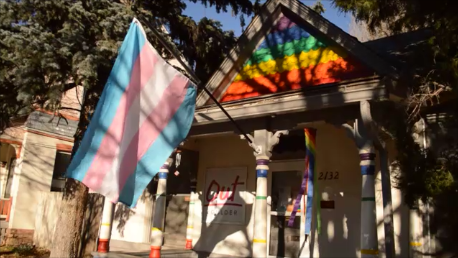
Monday, Nov. 17 marked 2017’s Trans Day of Remembrance (TDoR), honoring the lives of transgender people lost this year. It’s a day to stand in solidarity, but it’s also a time for non-trans people to educate themselves about the dangers trans people, especially trans women of color, endure in everyday life.
In the week leading up to TDoR, Out Boulder County organized Trans Awareness Week, with most events geared toward helping cisgender (the term for those who identify with the gender they were assigned at birth) people become better allies to the trans community.
Cisgender allies are important to the transgender community because violence against trans people often stems from ignorance and intolerance on the part of non-trans people.
“A good ally is somebody who spends some time to educate themselves,” says Ravyn Wayne, a volunteer on Out Boulder County’s board of directors and trans steering committee.
A quick lesson in gender goes something like this: Gender is socially constructed. Humans, as a society, have created what it means to be “feminine” or “masculine” by assigning meaning to certain characteristics (like one’s physique or demeanor), or even to certain objects (like toys or clothes). This system relegates nearly everything into two categories, a gender binary. The consequences of such a binary are harsh for those who don’t fit the mold.
“[Gender] has become so fundamental, it’s become invisible,” says Jennifer Molde, who describes herself as an out and proud trans woman and activist. She also volunteers with Out Boulder County and helped found the trans steering committee. According to Molde, we automatically assign gender to people in order to apply these two cultural definitions of male and female.
However, definitions and understandings of gender are evolving. The concept of gender as a spectrum is slowly working its way into mainstream parlance. People can still identify as firmly female or male, but there’s fluidity, both between and outside of those categories. In essence, the spectrum is infinite.
“It’s not up to me, or anybody else, to define what your gender is for you,” Wayne says. “That’s something that you have to figure out on your own.”
Educating yourself about gender concepts saves trans individuals the energy of constantly educating those around them (while they are often spending immense energy every day on surviving in a binary world).
“It is not OK to misgender somebody,” Wayne says, but mistakes happen. Wayne stresses a simple apology, correcting the pronoun, and moving on with the conversation. Getting flustered usually makes the situation worse.
When in doubt about pronouns, politely ask. Wayne suggests including pronouns in introductions as “it automatically signals to somebody in the trans community that this is somebody who understand the importance of pronouns.”
Molde adds that if you are unsure, use the neutral pronouns they, them and theirs. She says she does this until the person’s gender is said either through pronouns or otherwise.
Respecting people’s pronouns also involves correcting others when they use the wrong one.
A lot of trepidation lies in the trans experience, in everyday actions that cisgender individuals take for granted, like using a public restroom. Offering to accompany a trans friend to the restroom can make them feel safer.
Wayne says a really good ally will encourage public spaces with single-stall restrooms to make them gender neutral.
Allies have to speak up in myriad situations. Wayne encourages people to not tolerate transphobic comments (including jokes), both online and in person.
And cis allies need to be visible to the transgender community. “Show up,” Wayne says. “The greatest disservice that you can do is to say you’re an ally, but you don’t show up to the events where we need you the most.”
When someone is transitioning or questioning their gender identity, Sorin Thomas, the non-binary executive director and clinical supervisor at Queer Asterisk, stresses the importance of listening and believing the person and bringing awareness into the spaces cisgender people occupy.
Molde encourages cisgender allies to show interest when a friend is questioning their identity, “but try to keep [the questions] from being too intimate. You shouldn’t ask them about their genitals or physical changes in their body.”
Dr. Karen Scarpella, executive and clinical director at the Gender Identity Center, adds that you should let people experiment with their gender, unless asked for direct advice.
“Trans people aren’t helpless,” she says.
She stresses not treating trans people like an “oddity.”
“If the person would like to talk about their experience and they’re willing to share that with you, that’s a privilege, but that’s not something that we’re entitled to,” she says.
Reporting on transgender murders can be difficult as many victims are misgendered following their death. But so far there are more than 270 reported murders of trans and gender non-conforming people worldwide in the past year (as of Nov. 20). It’s never been more pressing to become a better ally.














